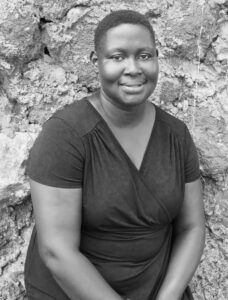
My name is Oroma Grace Lanek. I am Ugandan. I am currently doing a PhD degree in anthropology. My PhD research project looks at practices of caregiving during the Ebola epidemic in Gulu in 2000. I investigate how caregiving practices lead to existential vulnerability, which do not have a clear ending. I am also working on research projects on the Covid-19 pandemic like this project on Covid-19 tests. This is already the second Covid-19 project I am involved in. I profit a lot from my research experience on Ebola epidemics for understanding the challenges of the Covid-19 pandemic especially in regards to caregiving. At the beginning of the Covid-19 epidemic in Uganda, caregivers were not allowed to enter the treatment centers. But health workers were few and overwhelmed by the number of patients admitted to the treatment units. In this situation patients were left unattended to and even died because their critical condition was not noticed. This reminded me of the Ebola epidemic in Gulu in 2000, the solitary deaths in the Ebola Treatment Units at that time, and the immense importance of caregiving by relatives. In fact, in the case of Covid-19, private hospitals have now developed a new protocol. The health workers allow one person to provide care to a patient, on the basis that the caregiver is a primary contact case and subject for further medical investigation. The caregiver sits next to the patients, which health workers cannot do in our setting. Caregivers monitor the health condition of the patient, alert health workers, and provide palliative care. Both, Ebola epidemics and the Covid-19 pandemic show that in our health system, caregiving provided by relatives and friends is essential for saving people’s lives and this calls for the adaptation of practices in caregiving during every epidemics and pandemics.
In this project on Covid-19 testing I am interested in what people think about the Covid-19 response. On the one hand there are many myths about Covid-19 – myths about vaccines and myths about testing. On the other hand, people think that masks, hand washing, and social distancing hasn’t helped to stop the pandemic. They think that the government should do more. For example, everyone should be tested so that those who are positive can be treated and those who are negative can be protected. But tests are expensive in this country and few people can afford them. I am interested in the question of how the various measures that were taken and were not taken shape people’s perceptions of the disease, and health seeking behaviors.